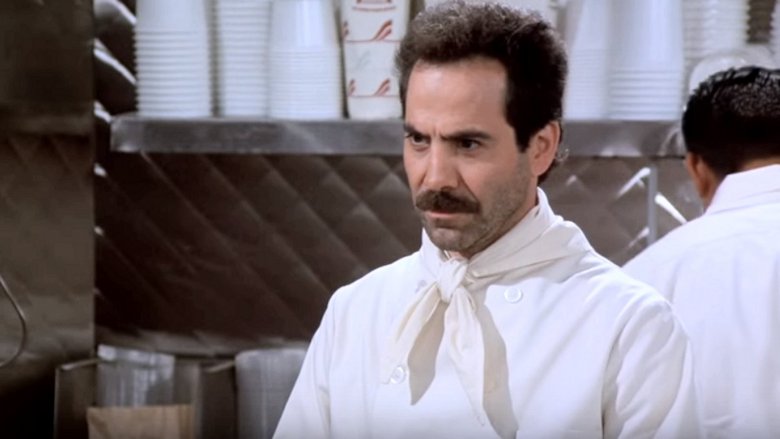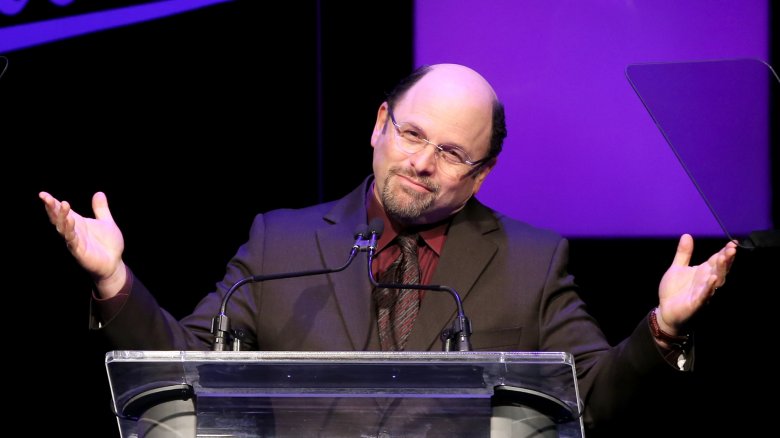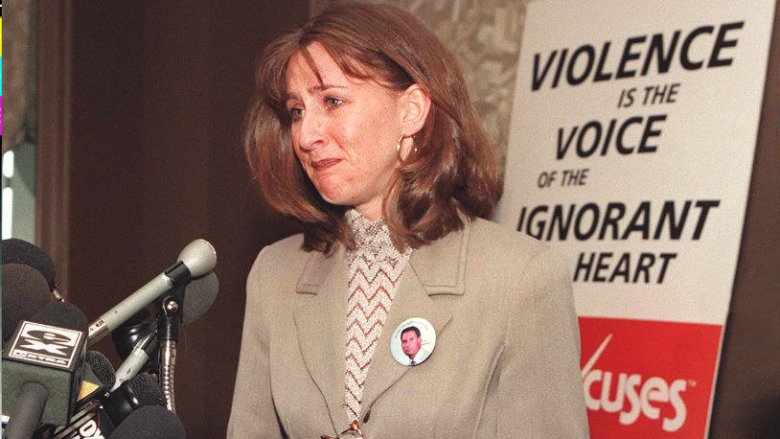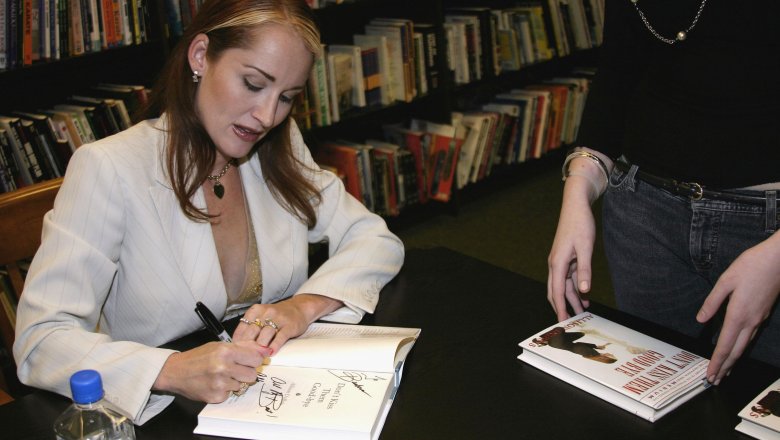TV Shows That Angered Their Real-Life Characters
Everyone has imagined watching a movie based on their life, but even the most narcissistic people wouldn't dream of seeing their experiences adapted into a weekly TV series. Sure, a movie could portray that one crazy thing that happened to you a couple of years ago, but a TV show? It would have to delve into your monotonous day-to-day routine, complete with bills, lazy breakfasts, and Netflix marathons. Then, if you get especially unlucky, those powerful TV producers might take creative license with your story, and put a character on screen that's supposed to be you, but isn't anything like the real you. That's scary.
Real people have inspired — or at least claimed to have inspired — many popular characters on TV, and they haven't always been too happy about the shenanigans of their syndicated counterparts. Sometimes they have had good reasons, and other times, their arguments have seemed like...well, a stretch. Here's a look at TV shows whose characters angered real-life people.
Dueling Costanzas
What's the deal with Costanzas, anyway? In a story that could have been ripped from a Seinfeld script, Time reported in 1998 that Jerry Seinfeld was being sued by an old college buddy named Michael Costanza on charges of libel, slander, and unauthorized use of his identity. Michael Costanza and his lawyer argued that the character of George Costanza, as played by Jason Alexander, had stolen Michael's identity as a "short, heavyset, and bald" man, without giving proper credit. Costanza's lawyer stated that the portrayal of George as a "jerk" had been detrimental to Michael's life. The irony this, of course, is that suing Jerry for using his likeness sounds exactly like the sort of jerk-store thing that Alexander's George Costanza would've done.
Now, every true Seinfeldian out there knows that the show's writer, Larry David, actually based George Costanza on himself. Seriously, just watch a few episodes of David's Curb Your Enthusiasm and you'll be convinced. Anyway, the Michael Costanza saga ended exactly like it would've ended if it were a Seinfeld episode: According to E! News, Michael Costanza not only lost his suit, but was ordered by the judge to pay a $2,500 fine for filing a frivolous complaint. Afterward, Larry David made it clear to the press that he wasn't surprised about the ruling, stating, "the universe would be out of kilter if someone named Costanza won anything." You know, unless he started always doing "the opposite"...
The real Hawkeye Pierce was bitter about M*A*S*H
The dramedy series M*A*S*H* actually depicted the Korean War, but looking back, that conflict was merely used as a stand-in for Vietnam, with the public's growing resentment for the controversial war immortalized by Alan Alda's fan favorite U.S. Army surgeon, Hawkeye Pierce. Week after week, Hawkeye's pacifistic views served as the moral conscience of the series, giving a loud voice to millions of anti-war viewers. Everyone loved Hawkeye, it seemed, except one man: the true "Hawkeye," Dr. H. Richard Hornberger, who wrote the book M*A*S*H was based on.
Because Hawkeye's sarcastic, heartfelt voice mirrored Hornberger's own, the general public often conflated the the character and the real man. However, according to History, the politically conservative Hornberger disliked the liberal sentiments of his TV counterpart, and once even said that the popular series "tramples on my memories." Of course, financial factors might have also played a role in Hornberger's resentment, as he reportedly sold the rights to his story for only a minor sum, and earned just $500 an episode.
Tom Cruise vs. Viacom
Love them or hate them, those potty-mouthed kids of South Park will go down in TV history for their fearless satire of everything from World of Warcraft to The Passion of the Christ, with countless real people mercilessly parodied throughout the show's run. However, one episode that particularly stands out is the infamous "Trapped in the Closet," which not only lampoons the Church of Scientology, but offers a fictitious version of Tom Cruise who locks himself in Stan's closet and won't come out. According to the Independent, the real Tom Cruise wasn't happy about his South Park characterization — or the way that the show spoofed his much-debated religion. At the time, Cruise was busy promoting the Paramount action flick Mission: Impossible III, and he allegedly threatened to pull out from all promotion if the episode was rebroadcast. How? Because of the way these corporate spiderwebs work: Paramount is owned by Viacom, and Viacom owns Comedy Central, which airs South Park.
A repeat showing of the episode was canceled, and South Park's creators went public about the censorship with a loud, humorous statement regarding their supposed worship of "Xenu." Cruise, Viacom, and so on denied the story about Cruise's threats, but nobody believed them, with the Los Angeles Times even referring to the incident as "Closetgate."
The Goldman family vs. American Crime Story
If you were alive during the 1990s, then you remember the O.J. Simpson trial. It's hard not to, considering it was blasting from TV screens on a nearly 24/7 basis for so long. It's no wonder that viewers were riveted when American Crime Story adapted the real-life saga into a dramatic TV season, with even real lawyer Marcia Clark calling it "amazing TV." However, not all of the show's "characters" were so impressed, according to the Chicago Tribune.
Kim Goldman, played by Jessica Blair Herman in the series, was the sister of the murdered Ronald Goldman, and she tweeted her immense relief when the series ended, saying it had "opened old wounds." Goldman had previously vocalized her anger at American Crime Story in an interview with Today, criticizing the show for not giving enough attention to the murder victims — both her brother Ronald, as well as O.J.'s wife Nicole Brown Simpson — particularly due to her view that her brother was a hero, stating "What I think is unfortunately going to get lost in this is that my brother was doing a good deed. [He] walked in on what we believe was a horrific crime and he didn't run." Goldman's father, Fred, shared the same disappointed views in an email to Bustle.
Carol Burnett sued Family Guy
Comedian and actress Carol Burnett certainly wasn't the first person to get angry about her portrayal in the raunchy animated sitcom Family Guy, but her response made headlines. BuddyTV explained that Burnett's problems were with the 2006 episode "Peterotica," which depicted an animated version of Burnett, even mentioned by name, working as a janitor at a porn shop, while mimicking Burnett's famous "Charwoman" character from The Carol Burnett Show. The sequence, which included an imitation of the earlier show's theme song, concluded with a lewd sexual comment about Burnett's father.
Not amused, Burnett filed charges in 2007. Though she didn't publicly comment on her depiction, the lawsuit argued that the show had used her likeness and character without permission. In the end, though Judge Dean Pregerson vocally agreed that Burnett's depiction in the series was distasteful, rude, and unimaginative, he dismissed her lawsuit, saying Family Guy's creators were protected by the First Amendment.
The Secret of exploiting real-life people
In 2016, the U.K. television station ITV premiered The Secret, a crime/horror series depicting the true story of Colin Howell, a sociopathic dentist and faithful churchgoer whose affair with a teacher led him to murder his wife and the teacher's husband. Though the series won a degree of critical acclaim, the victims of the real life "secret" felt traumatized by seeing such a painful time in their lives put on TV, despite their attempts to keep the show from being made.
Lauren Bradford, the daughter of Colin Howell, penned an essay for the Guardian saying that The Secret's producers had exploited her real family tragedy, disregarded the victims, and taken away her voice, resulting in "further feelings of loss and lack of control." In response to Bradford's statements, Radio Times reported that British Prime Minister David Cameron actually assigned his culture secretary with the task of looking into the case, and seeing if something could be done to prevent future exploitative cases.
Real Medium, big business
The popular TV show Medium starred Patricia Arquette as Allison Dubois, a psychic medium who used her powers to help local law enforcement solve murder crimes. What some may not realize is that Dubois is a real person, and whether or not one believes in her psychic abilities, Dubois told Oprah that she has assisted real police officers in criminal investigations for years. However, seeing her life blown up into a regular TV series brought new challenges to her routine — not because of Arquette's portrayal, but because of the public reaction it engendered.
Her newfound fame brought her a "a never-ending avalanche of people wanting me to work the murders," Dubois said, as transcribed by the Huffington Post. Constantly receiving requests from across the country put Dubois into a severe depression, and she stated that it was "very hard to live in that dark place for so long." Eventually, Dubois took a break from it all, which she said helped her process the emotions and "get back to being who I was."
Finding Fawlt with John Cleese
If there's one performance that comedian John Cleese will forever be remembered for, other than his famous collaborations with the rest of the Monty Python crew, it's his role as Basil Fawlty, the high-strung hotel owner and protagonist of Fawlty Towers. It seems hard to believe that a hotel like that could ever exist in real life, but Basil and his wife Sybil were actually inspired by the real-life owners of the Gleneagles Hotel, Donald and Betty Sinclair. According to the Independent, the Monty Python gang stayed at the Gleneagles Hotel in 1970, and came back telling stories about how Donald Sinclair "ran it like a high-security prison," corrected the way customers placed their own silverware, and even brought one of the crew's suitcases outside believing it contained a bomb. Cleese was inspired, and adapted these experiences into Fawlty Towers.
Though the deceased Donald Sinclair never spoke out about the matter, a 2002 article in the Telegraph made it clear that Betty Sinclair was no fan of John Cleese, whom she regarded as a "complete and utter fool. He's held my family up to ridicule and made a lot of money doing it. My husband was no Basil Fawlty. He was a gentleman and a very brave man." That said, the Independent interviewed a former waitress for the Sinclairs who disagreed, stating, "Donald Sinclair was worse than Basil Fawlty, much worse."
Trumped by Baldwin
Saturday Night Live has been spoofing United States presidents and presidential candidates for decades, from Chevy Chase playing Gerald Ford in the 1970s to Phil Hartman playing Bill Clinton in the '90s. Generally, politicians have laughed this off as part of the job. George W. Bush, for example, even jokingly wondered whether he or his SNL counterpart invented some of the more well-known "Bushisms."
One politician who is not amused by parody: Donald Trump, who was so angered by Alec Baldwin's recurring impersonation of him during his 2016 presidential campaign that he tweeted, "Time to retire the boring and unfunny show. Alec Baldwin portrayal stinks. Media rigging election!" As Baldwin continued playing the Trump character, the real Trump went on to tweet, "Alex Baldwin, whose dieing [sic] mediocre career was saved by his impersonation of me on SNL, now says playing DJT was agony for him. Alex, it was also agony for those who were forced to watch. You were terrible."
As reported by Politico, President Trump was similarly displeased with Melissa McCarthy's water-gun-firing portrayal of his former press secretary, Sean Spicer. Spicer himself reportedly found the skit amusing enough that he tried to convince his higher-ups to let him shoot a super-soaker at the next briefing, according to Vanity Fair.
No "Soup Nazi" for you
Between "close talkers," "double dippers," "yadda yadda yadda," and "Festivus," Seinfeld remains one of the most quotable TV series of the last 25 years — and nothing tops the "No soup for you!" loudly proclaimed by the dreaded Soup Nazi. According to the Guardian, TV's most popular soup dictator was a character based on a real-life Manhattanite named Al Yeganeh, whose soup shop has been open since the 1980s. Even before Seinfeld, Yeganeh was widely known amongst New Yorkers for the incredibly strict rules he imposed on customers, which he believes are simply good business sense. Interviewed by the New Yorker in 1989, he explained, "I tell you, I hate to work with the public. They treat me like a slave. My philosophy is: The customer is always wrong and I'm always right. I raised my prices to try to get rid of some of these people, but it didn't work."
Yeganeh was enraged about his TV caricature, particularly the "Nazi" label the show applied to him. A 1996 Chicago Tribune article noted that when Jerry Seinfeld later stopped by the soup shop to apologize for hurting Yeganeh's feelings, Yeganeh proceeded to curse him out for three minutes. For the record, customers really do swear that the soup is worth enduring the rules, although Yeganeh might want to apply his rigorous customer service standards to his hiring practices — in 2017, his company had to file for bankruptcy protection after the CFO was arrested for tax evasion.





